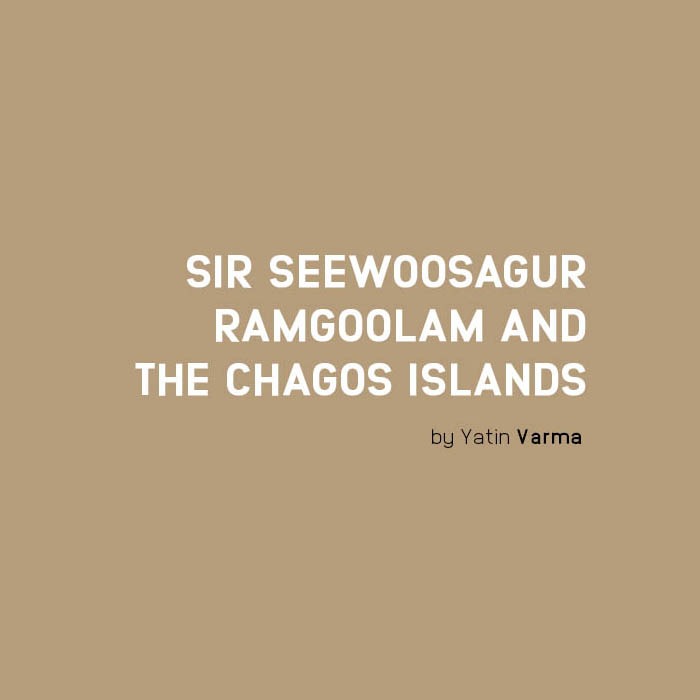During a press conference, upon his return from the International Court of Justice (ICJ) in The Hague, on 12 September 2018, Sir Anerood Jugnauth (SAJ) lashed out shamelessly against Sir Seewoosagur Ramgoolam (SSR) over his handling of the Chagos issue. To say the least, it was a cowardly act to criticize the Father of the Nation 33 years after his death. One could question his own contribution to the whole issue during the 18 years he was Prime Minister. The Chagos issue should have transcended party politics. SAJ should have shown magnanimity and invited leaders of different opposition parties to form part of the official delegation on such a matter of national interest. This has revealed that at the age of 88, SAJ has still to become a statesman. Speeches are forgotten, it is the touch of the politician that lingers. It is apposite to note that no mention was even made of Navin Ramgoolam’s initiative to lodge a case before the International Tribunal For the Law of the Sea against the United Kingdom regarding the marine protected area related to the Chagos Archipelago and its favourable outcome in 2015. This MSM led Government appears so utterly politically bankrupt that it is scrambling to restore public confidence. It has now seized the Chagos issue as a stick with which to beat its political drum. In so doing, it is trying to redefine history and if it was up to the MSM, the name of Ramgoolam would be erased and replaced by Jugnauth. It would be worth recalling that Anerood Jugnauth left the political arena in the 1960s to become a magistrate rather than to continue the struggle for independence.
It would be appropriate to put things in their right perspective and set the record straight. On 08 November 1965, the Chagos Islands were called the British Indian Ocean Territory (BIOT) by the British following the BIOT Order. This included 64 out of 65 islands of the Chagos. Although, that partition was decided prior to the high level meetings at Lancaster House, SSR, as head of the delegation, faced a lot of criticism. Mauritius was then a colony, having Sir John Shaw Renie as Governor who presided over the Cabinet of Ministers with Tom Vickers as the secretary to Cabinet, both British subjects. The inequality of forces was clear. Great Britain also had the legal arsenal to allow the splitting of colonial territories by virtue of the Colonial Boundaries Act 1895. That law unjustly allowed London to split certain African and Asian territories which were on the threshold of obtaining independence.
Even prior to 1965, the British and the Americans showed a keen interest in the Chagos as was reported in Advance of 22 February 1964 and L’Express of 06 August 1964. It is all the more revealing to note that in a recent interview, Sir Hamid Moollan mentioned that he found Malboro cigarettes on the shores of the Chagos back in 1963 and when asked the Chagossians stated Americans came there from time to time. An extract from the 23 September, 1965 Lancaster House meeting showed that the archipelago would be detached subject to certain conditions namely:
- When the necessity for certain facilities on the islands would cease, the Chagos Islands will be returned to Mauritius.
- The British Government would offer to discuss with the American Government to ensure that Mauritius benefits as far as possible from: (a) fishing rights in the waters of the archipelago, (b) facilities for navigation and meteorology, (c) usage of the runway in cases of emergency and (d) all minerals and oil discovered in or near the archipelago would belong to the Mauritian Government.
A note from the British Colonial Office dated 06 October 1965 from the governor Sir John Shaw Renie indicated that the British Government would present the Mauritian demands to the American authorities. The document mentioned that the British Government took good note of the eventual return of the archipelago to Mauritius. The British, nevertheless, insisted on its sovereignty until it was necessary for them and the Americans. The reply of the Secretary for State for the colonies, telegram 254 of 18 November, 1965 revealed the assurance of an eventual return of the Chagos to Mauritius could be given, subject to the decision concerning the necessity of keeping or returning the archipelago being vested with the British. It would seem that in a letter, former British Prime Minister Margaret Thatcher recognized Mauritius as the only country that could eventually claim sovereignty over the islands if they would no longer be necessary for the defence of the West.
SSR set the foundation for an eventual return of the Chagos Islands way back in 1965 and the progress made since on the issue, the victory before the Internal Tribunal of the Law of the Sea and the recent case before the International Court of Justice can largely be attributed to his actions. On 12 September 2018, Sir Aneerood Jugnauth also spoke about the compensation then obtained, questioning how same was used and by whom. It would be good to take him down memory lane. In 1972, SSR wrote to the British referring to the £650,000 compensation to the Chagossians and stated resolutely: Of course, this does not in any way affect the verbal agreement giving the country all sovereign rights relating to minerals, fishing, prospecting and other arrangements. All the above elements clearly show that Sir Seewoosagur Ramgoolam firmly believed in the sovereignty of Mauritius over the Chagos islands.
Bibliography:
1.The Road to Independence by Moonindra Nath Varma
2.Sir Seewoosagur Ramgoolam et les accords de 1965 by Hervé Lassémillante


Leave a Reply